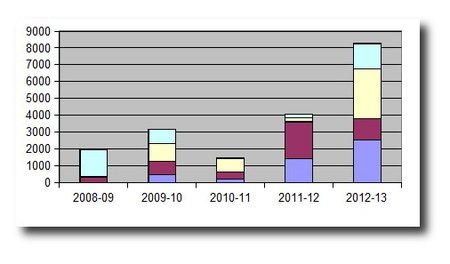 Bishop Hill
Bishop Hill Shale "a game changer": official
 Jul 18, 2013
Jul 18, 2013  Energy: gas
Energy: gas Interfax Natural Gas Daily says that a report prepared for DECC in the wake of the British Geological Survey estimate of shale gas resources in the UK will find that it and similar resources around Europe prove exploitable then gas prices could fall by 28%.
Following the release of a study by the British Geological Survey that shows there could be 40 trillion cubic metres of shale gas resources in England alone, the impact of these reserves on the UK’s gas prices has been a hot topic.
If the UK and continental Europe combine to produce around 100 billion cubic metres per year of unconventional reserves between 2020 and 2030, Navigant expects “a combination of local gas and readily available LNG puts sufficient pressure on oil price-indexed gas supplies that gas prices fall towards the long-run marginal cost, getting to 50 pence per therm [p/th] by 2030”.
Under this ‘low price scenario’, Navigant believes continued cost efficiencies could even “move prices downwards to somewhere between 35 p/th and 50 p/th”. The fall would mean prices have the potential to halve from 2012’s average trade price of 69 p/th, making the UK’s shale resources an undoubted ‘game-changer’.
David Kennedy of the Committee on Climate Change has of course declared that shale is not a game changer. But given his remarks on climate sensitivity I know who I am going to believe.









